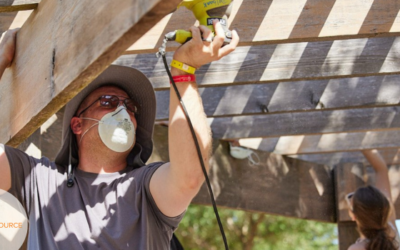Click here to Download the Leader Guide for this Bible Study Series.
Click here to Download the Participant Guide for this Bible Study Series.
In January 1986, NASA was prepared to send the Space Shuttle Challenger on its second voyage into space. Most Americans were excited for this particular launch because it featured the Teacher in Space Project. This project selected one lucky civilian teacher to go to space in hopes of inspiring students.
As the astronauts and millions of Americans looked forward to the launch, one engineer at Morton Thiokol, a contractor for NASA that manufactured the powerful booster rockets, was growing increasingly concerned about the launch. Roger Boisjoly sounded the alarm six months before the January 28 launch date.
The two boosters attached to the Challenger contained different sections that were sealed together with a rubber material known as an “o-ring.” The function of the o-ring was to prevent flames from igniting the metal casing that would cause an explosion inside the central hydrogen tank. The problem, Boisjoly told NASA, was what happened to the o-ring inside the joints of the boosters under cold weather conditions. It stiffened and failed to seal the sections together. Knowing how cold temperatures can get at Cape Canaveral in January, he wrote his managers and predicted a “catastrophe” and loss of life if the launch date were to go on as planned. Despite hours of constant and passionate arguing to delay the launch, NASA ignored the advice and kept the January 28 launch date.
As the Challenger was eased onto the launch pad on January 27, Boisjoly and his fellow engineers once again begged NASA to delay the launch. Temperatures dropped below freezing throughout the night and into the morning hours. NASA officials again rejected their argument and vowed the launch would continue as scheduled.
Seventy-three seconds. That’s the amount of time that elapsed after liftoff for Boisjoly’s prediction to come true. The o-ring on one of the boosters failed, causing fire to shoot out from the booster and hit the central hydrogen tank. About 40 million Americans watched in shock as their excitement turned to horror when Challenger exploded and disintegrated at 46,000 feet over the Atlantic Ocean. All seven astronauts were killed.
This tragedy teaches us what can happen when someone who knows what they’re talking about sounds the alarm and their advice is not taken. Large scale errors like this may only happen every so often, but we’ve all experienced moments when we don’t listen and face a dire consequence.
Disregarding a parent’s command, disobeying the posted speed limit sign, ignoring instructions from a teacher, or not following guidelines at work because you believe they don’t apply to you are some examples of failing to listen. We occasionally do this to the people around us, but it also happens in our faith journey. God’s Word serves as the ultimate authority for how we are to act as His children. It tells us what God expects from us but also who God is, His loving promises, and how He fulfilled His plan to save us from our sin.
An endless amount of wisdom is found in Scripture that teaches us who we are, what we are to do as God’s people, and why obeying God is so crucial to Christians. God saw it as being so important that He came down to us as the Word incarnate in Jesus Christ to reveal His timeless truths to us. Sadly, we often fail to listen to His words and pay a price for doing so.
Following the Challenger disaster, President Ronald Reagan appointed the Rogers Commission to investigate the tragedy. The Commission’s report came to three main conclusions, one of which was that serious concerns of the engineers were ignored. Not listening to the engineers resulted in the loss of seven lives. Even Boisjoly suffered in the aftermath of the tragedy. Debilitating headaches, depression, and an inability to sleep became normal to Boisjoly. He went on to testify against NASA and Thiokol and filed lawsuits against them. For that act, he was blacklisted and ostracized from the space engineering community. He later said in a 2012 interview with National Public Radio that he was very angry no one listened to him.
Why don’t people listen to one another? There are many reasons, and some include not being interested in what the other person is saying, lacking understanding in regard to what they’re being told, not having patience to truly hear what the other person is saying, having no respect for the speaker or outright rejecting what they say, or something as simple as being too tired to listen well. For NASA, it was the overarching desire to meet deadlines on time and to keep politicians happy in order to keep their funding.
Failure to listen and listen well proved costly, just as it still does for us today. It costs us emotionally, financially, physically, and spiritually. God knew the cost of His children not listening to Him. The price for our sin was certain death and an eternity separated from God. Yet God in his infinite mercy and grace placed the burden of that cost on His Son who endured the cross to pay the cost of our sin and inattentiveness. He then rose again from the dead to declare the cost paid for in full and then declared our lives forever cleansed in his righteous blood. We now live with the hope of spending eternity in heaven worshiping and praising Him forever.
Session Overview
Listening can be hard. Whether it’s a parent, teacher, coach, or youth leader, we may occasionally find ourselves tempted to be disobedient. Sometimes we don’t want to do what we’re being asked to do. Other times we refuse to listen out of anger or frustration. We might even do the exact opposite of what we’re told because we think we know better. Showing disregard to the supportive adults in our lives is not good, but it becomes problematic when we take the same approach toward God and his Word.
Adolescence is often a time when young people push back against the beliefs they grew up with. If youth tell God “I’m not listening” because they don’t like what He says, disagree with His Truth, or outright reject Him, they are more likely to suffer misery, sorrow, and confusion about who they are, what they believe, and what purpose they have in life.
This four-part study explores the importance of listening to God by examining Old Testament people who struggled to listen and the resulting impact. Your youth will begin to understand how God communicates with His people, why they should trust His leading, and how they can better follow His direction so that they can endure the ever-changing realities of life. They will also learn how God’s plan of salvation endured despite His people failing to listen, and that there is forgiveness and hope found only in Jesus when we do fail.
These are the four parts of this study:
Part 1: Adam and Eve: Not Listening to God’s Command
Part 2: Cain: Not Listening to God’s Warning
Part 3: Israelite Spies: Not Listening to God’s Directions
Part 4: Jonah: Not Listening to God’s Plan
Click here to Download the Leader Guide for this Bible Study Series.
Click here to Download the Participant Guide for this Bible Study Series.
There are four devotions which go alongside this study, the devotions will be linked below when they are posted.







0 Comments